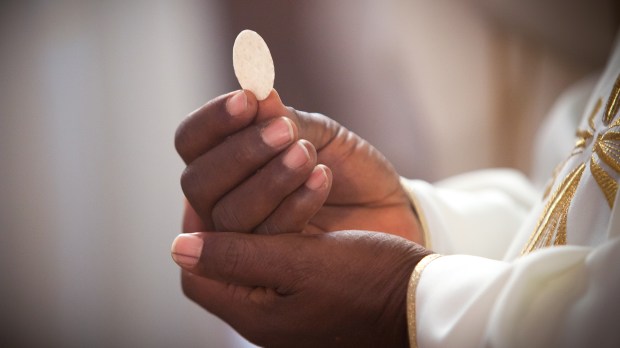[Editor’s Note: In response to a recent piece byJudy Landrieu Klein, our “Daily Catch” blog polled readers about their habits of confession and the reception of Holy Communion. As nearly 60% of the respondents admitted to knowingly participating in Communion while not in a state of grace, we asked canonist Jenna Cooper to address what the church teaches about this issue, and why.]
As the Vatican II documentLumen Gentium tells us, the Eucharist is the “source and summit of Christian life” (LG 11), in which Jesus Christ is made really and truly present to us. During the holy sacrifice of the Mass, Catholics believe that the bread and wine become the Body and Blood of Christ—not in a merely symbolic way, but truly and literally. This is why we have customs of special reverence for the Blessed Sacrament, such as genuflecting before a tabernacle, keeping a sanctuary lamp or candle burning, and maintaining a respectful silence in churches or chapels where the Sacrament is reserved.
In a similar but more important sense, we can also speak of the need to show reverence for the Blessed Sacrament in the depths of our own souls, by our being properly disposed to receive the Eucharist and by only receiving Communion worthily. But what does this mean?
The Church’s law
There are two canons in the Code of Canon Law that relate to the worthy reception of Holy Communion. Canon 915 requires ministers of the Eucharist to refrain from admitting to Communion those who are “obstinately persevering in manifest grave sin” (in other words, those who are continuing on, after the sinfulness of their situation has been duly explained to them, in a state of grave sin that is outwardly very obvious). However, while canon 915 may be the more famous canon of the two, it actually does not apply directly to most faithful Catholics.
On the other hand, canon 916 is something that does specifically pertain to each one of us. In canon 916, we are told that a person “conscious of grave sin” should not “receive the body of the Lord without previous sacramental confession.” While canon 915 calls on an appropriate third party (such as a parish priest) to refuse Communion to those in a visible state of serious sin, canon 916 places an obligation on individuals to examine their own conscience to discern whether they might have committed any sins which should prevent them from receiving Communion. Consequently, this canon also directs those who are aware of having committed a mortal sin to make use of the sacrament of Penance—the normal means through which sins are forgiven and a person is reconciled with God—so that they may once again become fit to share in the Eucharist.
The “why” behind the law
This canon has deep theological roots in the Church’s tradition, which is in turn founded in Sacred Scripture. As we read in St. Paul’s First Letter to the Corinthians:
“Whoever eats the bread or drinks the cup of the Lord unworthily will have to answer for the body and blood of the Lord. A person should examine himself, and so eat the bread and drink the cup. For anyone who eats and drinks without discerning the body, eats and drinks judgment on himself. That is why many among you are ill and infirm, and a considerable number are dying.” (1 Corinthians 11:27-30)
Here, St. Paul recounts a dramatic scenario in which some early Christians suffered bodily illness and death due to their unworthy reception of Holy Communion. Although this is perhaps not likely to be a normal occurrence in our modern parishes, the spiritual effects of partaking in the Eucharist unworthily are the same today as they were in St. Paul’s time.
Receiving Communion when knowingly in a state of grave sin is, in fact, a grave sin in and of itself. Specifically, it is a sin of profound disrespect for the real presence of Christ in the Eucharist, and as such is considered a form of sacrilege. Like other mortal sins, choosing to engage in this type of sacrilege is a wound to the soul that results in spiritual death.
Is anyone ever worthy?
Of course, the Eucharist is such an awesome gift that no human being could ever be considered truly “worthy” in the strictest sense of the word. But at the same time, it’s important to keep in mind that it is only those who are in mortal sin should refrain from receiving communion. “Though the just fall seven times” (Proverbs 24:16), some sins are venial, not mortal. By definition, a mortal sin involves a conscious, deliberate choice, and so a serious Christian striving for closeness with God is unlikely to fall into mortal sin in the course of an overall virtuous day-to-day life.
The Church actively encourages all those who are able to receive Holy Communion to do so as often as they can, even daily if possible (CCC 1389). For those who are properly disposed, Holy Communion can “wipe away venial sins” (CCC 1394), and provide the strength to resist the temptation to mortal sin (CCC 1395). This is what is meant when we say that the Eucharist “is not a prize for the perfect, but a powerful medicine and nourishment for the weak.” (cf. Amoris Laetitia footnote 351)
Jenna M. Cooper is a consecrated virgin of the Archdiocese of New York. She completed a licentiate in canon law at the Pontifical University of the Holy Cross in 2014.

